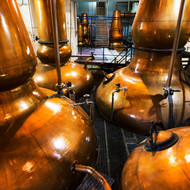What Is Whiskey Made Of?
15th Aug 2019
Although a subject of intense scholarly research, no one can pinpoint the origin of the spirit now known as whisky. Classical Greece invented the concept of distillation, but it’s unclear if they used it to produce spirits. An Arab chemist distilled alcoholic beverages by 800 AD. Only in the medieval British Isles, however, did the processes used to craft whisky from the ingredients it is made of develop, giving us what we drink today.
Medieval Irish and Scottish monks either learned these techniques from others, or discovered the process on their own. From this divine inspiration, we now enjoy the many wonderful varieties of whisky.
A Process Steeped in Tradition
The world’s great distilleries take great pride and care in the selection of ingredients that go into their products. True Bourbon whisky can only come from the western part of the US state of Kentucky where water pumped from limestone caverns has distinctive qualities. Same with distillers on the Scottish island of Islay who pull their water from pristine streams.
Whisky comes from a variety of different grains, either used separately or in combination. Whisky from the United States often relies heavily on corn, barley, rye, or other grains. Scottish whisky uses malted barley.
Distillers also take care in selecting barrels for ageing. These barrels have undergone specific processes to leach the right wood flavour into the product.
What is Whisky Made Of? Different Types of Whisky
Whisky comes in several varieties, and each variety is denoted by the geographic location and the production process. Different types bring unique tastes and styles to the enjoyment of drinking them.
Scotch Whisky
Scotch comes from a combination of carefully selected waters and malted barley. "Malted" refers to the process of steeping the grain in water until it germinates, releasing its flavour. It can come in three varieties. Single malt refers to the use of malted barley from a single location. Single grain means malted barley combined with other grains in a single distillery. Blended indicates multiple distilleries were involved in the prediction. Scotch whisky makers smoke malted barley with local peat.
Irish Whiskey
Irish whiskey must conform to a legally-defined process, and must be made only in Ireland. It's process requires triple distillation, and uses kiln-dried, raw, or malted barley.
Kentucky Bourbon
Bourbon originates in western Kentucky and is made using the region’s distinctive water from subsurface limestone caverns. It must comprise at least 51 percent corn and adhere to federal laws defining Bourbon distillation that date back to the late 1800s.
Tennessee Whiskey
Tennessee whiskey also relies on corn as the primary grain. The difference between it and other American whiskies lies in its reliance on sugar maple charcoal to give its product a distinctive flavor.
The Paramount Importance of Each Ingredient
The selection of ingredients and processes helps to differentiate the different types of whiskies, but also gives each brand its own unique taste. Some distilleries, such as small batch distillers like Black Draft, have gone so far as to invest in their own cornfields in the belief that corn grown in different locations delivers slightly different flavours. Laphroaig, meanwhile, insists on using peat from the same bog to smoke its malted barley.
This indicates a dedication, not only to excellence, but also consistency and reliability. Your Laphroaig, ideally, will taste exactly the same as it would have done 200 years ago.
Whisky represents a tremendous convergence of art, science, and tradition, bringing together age old processes to please modern palates.

